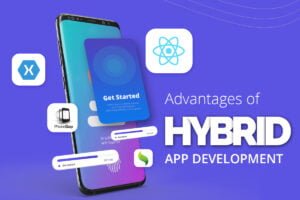Do you intend to create a mobile app for business but wondering what hybrid mobile app development is? Did you know that hybrid mobile app development UK has become increasingly popular of late and can offer businesses a range of advantages?
This blog post will look in-depth at hybrid mobile app development UK and explain how they differ from traditional native apps. We will discuss their benefits, where to get started with development, and why utilizing the services of a specialist hybrid mobile application developer may be beneficial for your organization.
So if you’re keen to learn more about what hybrid mobile app development UK involves, read on.
An Overview of Hybrid Mobile App Development
Hybrid mobile app development UK is a process that involves the development of applications for multiple mobile platforms using web technologies such as HTML, CSS, and JavaScript and frameworks such as Apache Cordova.
This approach allows developers to write code once and deploy it across various platforms without needing to rewrite or maintain different versions. The popularity of hybrid mobile app development UK has grown importantly over the past few years due to its efficiency and cost-effectiveness compared to native app development.
The main advantage of hybrid mobile app development UK is that it allows developers to quickly create a unified application experience across multiple platforms, while still enabling them to leverage existing web skill sets as well as native capabilities when needed. This approach can reduce time-to-market and overall costs associated with developing multi-platform apps.
Additionally, many popular frameworks, such as Apache Cordova, provide access to device APIs so developers can use native device features within their applications. When deciding between a hybrid or native approach for developing a mobile application, several factors should be considered, such as performance requirements, user experience expectations, available resources, and timeframe for deployment.

For example, if an application needs fast speed and responsiveness on one platform only, then it would likely benefit from using a native development method, whereas if the same performance requirements are expected across multiple platforms, then a hybrid might make more sense.
On the other hand, if the user experience is more critical than performance, then native may be more suitable since its capabilities allow developers to create an interactive and engaging UI/UX design tailored to each platform. In conclusion, hybrid mobile app development UK presents many advantages in terms of cost-effectiveness and time savings. However, there are still other considerations that must be taken into account before deciding which type of development method is best suited for a given project.
Depending on the app’s specific requirements it may make sense for some projects to leverage both approaches in order to attain better performance results on particular platforms while still maintaining cross-platform compatibility where needed.
Exploring Popular Frameworks and Tools For Hybrid Mobile App Development.
Hybrid mobile app development UK is becoming increasingly popular, as they offer developers the ability to create apps that can be used on multiple platforms. Several frameworks and tools have been developed for creating hybrid apps, making it easier for developers to create powerful and engaging user experiences.
Ionic is one of the most popular open-source frameworks for developing hybrid mobile applications. It uses web technologies such as HTML5, CSS3, JavaScript, and AngularJS to build native-like mobile applications. It has a set of tools like Ionic CLI, Ionic SDK, and Ionic Cloud that make development faster and more efficient.
Additionally, it offers a library of customizable UI components, which makes creating a visually appealing app easier. This framework is highly reliable and secure due to its focus on performance optimization, with even the latest version has added support for Progressive Web Apps (PWAs).
React Native is an open-source JavaScript framework created by Facebook to help developers create genuinely native cross-platform apps. It uses components written in JavaScript that is then compiled into native code for each platform (iOS or Android), meaning users get access to an app that looks and feels just like a native app but with the flexibility of writing code once for multiple platforms. React Native provides developers with access to numerous components from iOS and Android SDKs and other popular libraries like Redux or MobX to extend their features even further.
Flutter is Google’s open-source UI toolkit designed to help developers build beautiful cross-platform apps quickly without compromising on performance or quality. Flutter renders its widgets instead of using OEM widgets, allowing developers to create custom designs that look great at different sizes and densities while still being able to access device APIs when needed. It’s hot reload feature makes it easy for developers to quickly test changes without recompiling their entire codebase whenever they want to make a change.
Lastly, Apache Cordova is another open-source framework that allows developers to leverage web technologies such as HTML5, CSS3, JavaScript, and more with native device APIs to develop hybrid mobile applications for various platforms, including iOS, Android & Windows Phone 8/10. It relies on plugins that enable communication between the application’s JavaScript code and the underlying platform’s native functions, such as sending notifications or accessing device hardware like camera or GPS locations, providing developers with powerful capabilities compared with pure HTML-based mobile web apps.
Creating Cross-Platform Experiences With Hybrid Apps.
Creating Cross-Platform Experiences With Hybrid Apps is becoming increasingly popular in the tech world today. This app allows developers to create a single codebase that can run on multiple platforms, such as iOS and Android.
By utilizing web technologies such as HTML, CSS, and JavaScript, hybrid apps provide a platform for developers to leverage existing skill sets when creating content for different types of devices. When creating a hybrid app, the codebase is written once and then compiled into native code for each platform. This means developers can easily port their applications from one forum to another without having to rewrite the entire codebase.
Furthermore, hybrid mobile app development UK allows developers more control over the UI using web technologies rather than relying on a platform-specific language or SDK. Additionally, they enable users to access functionality previously limited to specific platforms, such as biometric authentication or full-screen immersive mode.

By leveraging cross-platform frameworks like React Native and Flutter, developers are able to quickly create robust mobile applications with rich user experiences in significantly less time than traditional native development processes. Additionally, these frameworks also provide access to third-party APIs that allow developers to easily integrate popular services such as Google Maps or Payment gateways into their applications.
Overall, hybrid apps offer a compelling solution for developing applications for multiple platforms quickly and cost-effectively. By utilizing unified UI components across all platforms coupled with features only available on specific devices, these apps offer enhanced user experiences as well as greater flexibility compared to native applications. Additionally, with rapid prototyping capabilities offered by frameworks like React Native and Flutter, developers can quickly test ideas and ship them out to multiple app stores faster than ever before.
Pros & Cons Of Developing A Hybrid Mobile App
Pros Of Developing A Hybrid Mobile App.
One of the most significant advantages of developing a hybrid d mobile app development UK is its cost efficiency. Hybrid apps function on multiple platforms and thus require less time and money for products. Furthermore, these apps can be used with both Android and iOS devices and do not require separate downloading from different app stores.
Not only does this allow users to access all the needed features in one single app, but it also eliminates the need to create multiple versions of the same application, helping developers and users save time and energy.
In addition, hybrid applications offer smooth operations with improved loading times due to their use of HTML5 technology.
1. Increased Flexibility.
Hybrid mobile apps are built using HTML, CSS, and JavaScript web technologies. This makes them more flexible than native apps, as developers can deploy changes to the code quickly rather than waiting for app store approval.
Additionally, hybrid mobile app development UK can be developed for multiple platforms (like iOS, Android, and Windows) from a single code base, which reduces development time and costs.
2. Leverage Existing Web Technologies.
Hybrid mobile apps leverage existing web technologies to create mobile applications that run on multiple devices. This means that developers do not have to learn new programming languages for each platform – they can develop the app using tools like HTML5 and JavaScript and use tools such as PhoneGap or Cordova for packaging it into a native application.
3. Easier Maintenance.
Since hybrid mobile apps are built with web technologies, they are much easier to maintain than native applications – developers only need to update the code once instead of having to make changes across all platforms separately in order to keep the app up-to-date.
Additionally, because these apps are hosted on web servers instead of the app stores, they can be updated immediately without waiting for app store approval.
4. Improved User Experience.
Hybrid mobile app development UK offers an improved user experience compared to their native counterparts due to their ability to access device features like cameras, GPS navigation, and other hardware components.
Moreover, since these apps are hosted in the cloud instead of downloaded from an app store first, users have instant access without waiting for installation or updates.
5. Offline Capability.
Unlike web applications, hybrid mobile apps can work offline because they can cache data locally on the device. This allows users to access content even when they don’t have an internet connection – making them ideal for situations where users may be in remote locations or traveling on a plane without network coverage.
6. Cost-Efficient Development.
Hybrid mobile app development UK is significantly cheaper than developing two separate native applications for iOS and Android platforms – meaning businesses can achieve a better return on investment (ROI).
Additionally, because these apps use standard web technologies there is no requirement for specialized software or dedicated teams – meaning development costs remain low throughout the process.
Cons Of Developing A Hybrid Mobile App.
Developing a hybrid mobile app development UK is an appealing idea because it can save time and cost, but several cons still should be considered. Because these apps use a combination of web-based and native technologies, they can compromise performance, security, and stability.

Poor performance can lead to lower conversion rates due to a lack of user-friendly features and substandard experience. Moreover, hybrid mobile apps may have trouble providing robust security for sensitive information like payment details or personal data.
Finally, developers also need to account for compatibility issues when developing for multiple devices since its code base is shared across platforms. As such, hybrid mobile apps can be a double-edged sword when not used properly due to their performance, security, and stability drawbacks.
1. Higher Development Costs.
The cost of a hybrid mobile app development UK is typically higher than the cost of developing a native application because developers must be familiar with both the native app development process and the web development languages used in hybrid applications.
This also means that additional time is required to develop a hybrid application as opposed to creating a native application.
2. Device Compatibility Issues.
Hybrid apps are not compatible with all devices, so developers must have different versions for different operating systems. For example, a hybrid mobile app development UK may work on Android devices but not on iOS devices or vice versa.
3. Performance Issues.
Although performance has improved significantly over the years, there are still issues related to interpretation when using hybrid applications. Since they are built using web technologies such as HTML, JavaScript, and CSS, they can sometimes be slower than native applications.
Furthermore, since hybrid mobile app development UK rely on specific web browsers to run correctly, users may experience compatibility issues if their device does not support the browser being used by the app.
4. Security Concerns.
Security is another major concern when it comes to building hybrid applications since these apps can be vulnerable to malicious attacks from hacker groups or other malicious individuals.
However, there are measures in place that can help reduce security risks such as encryption and authentication features that can be added to the development process.
5. Limited Native Capabilities.
While hybrid mobile app development UK provides access to many useful features and capabilities, they are limited when it comes to accessing native device capabilities such as camera access or NFC support functions.
This means that developers may have to write extra code to access these functions, which can add complexity and additional time/costs associated with development.
Cost Savings Through Open Source Technologies In Hybrid App Development
In the current digital era, cost savings are essential for businesses to stay competitive and profitable. Every business must develop hybrid mobile applications for a successful presence in today’s markets. Open source technology is an excellent way of achieving cost savings as it’s well-known for its affordability and flexibility in coding, customizing, and integration with other platforms.
With open source, developers can inspire end-users with the most innovative applications while saving high costs compared to traditional app development practices. Open source also eliminates any need to procure expensive software licenses, making them an excellent fit for small businesses that want to reduce costs and build apps that can withstand market competition.
Overall investments in developing hybrid apps through open-source technologies will help businesses maintain cost savings as they transition towards their mobile app goals.








